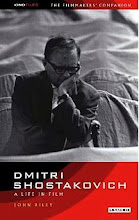
Trumpeter Tomasz Stanko's Barbican concert reflected the two halves of a career split by tragedy.
 Polanski's early short Two Men and a Wardrobe (Dwaj ludzie z szafa, 1958), scored around forty films. In 1969, aged 38, he died (depending on who you believe, as a result of a car accident or when some drunken horseplay went wrong).
Polanski's early short Two Men and a Wardrobe (Dwaj ludzie z szafa, 1958), scored around forty films. In 1969, aged 38, he died (depending on who you believe, as a result of a car accident or when some drunken horseplay went wrong).  Stanko, who had up to then been content within Komeda’s group, set out on his own, but continued to play his friend's music, climaxing with the 1997 album Litania, which itself became a classic.
Stanko, who had up to then been content within Komeda’s group, set out on his own, but continued to play his friend's music, climaxing with the 1997 album Litania, which itself became a classic. But the evening began with the world premiere of the Brothers Quay’s new short film, Maska, based on Stanislaw Lem’s 1976 short story. Anyone who has seen their work (this excellent two-disc set collects their short films) will know what to expect: odd animated marionettes playing out oblique but disturbing dramas in gelid, granular light. Maska showed their usual love of craftsmanship: even a shot that could be achieved in a few minutes in live action - a diaphanous cloth being drawn back - was carefully animated. Rich, luminous visuals – the dense shadows of the cavernous set, pierced by shafts of glowing highlights, are accompanied by a soundtrack that included sections of Penderecki’s De Natura Sonoris.
But the evening began with the world premiere of the Brothers Quay’s new short film, Maska, based on Stanislaw Lem’s 1976 short story. Anyone who has seen their work (this excellent two-disc set collects their short films) will know what to expect: odd animated marionettes playing out oblique but disturbing dramas in gelid, granular light. Maska showed their usual love of craftsmanship: even a shot that could be achieved in a few minutes in live action - a diaphanous cloth being drawn back - was carefully animated. Rich, luminous visuals – the dense shadows of the cavernous set, pierced by shafts of glowing highlights, are accompanied by a soundtrack that included sections of Penderecki’s De Natura Sonoris. As the last credit held the screen, Stanko’s sextet appeared and launched into a selection from his own score to the 1999 film Egzekutor. Starting insouciantly, Stanko’s husky trumpet was shadowed by soprano Justyna Steczkowska, each taking turns to ride over the other. Saxophonist Adam Pieronczyk occasionally joined in, adding more subtle colours to the duet. Meanwhile Steczkowska, in her spangly mini-dress, once or twice broke into a brief, self-absorbed, gentle wiggle. In the middle Pieronczyk’s dense and harder driven solos contrasted with pianist Dominik Wania, who alternated fluid runs with cool but decisive chords.
As the last credit held the screen, Stanko’s sextet appeared and launched into a selection from his own score to the 1999 film Egzekutor. Starting insouciantly, Stanko’s husky trumpet was shadowed by soprano Justyna Steczkowska, each taking turns to ride over the other. Saxophonist Adam Pieronczyk occasionally joined in, adding more subtle colours to the duet. Meanwhile Steczkowska, in her spangly mini-dress, once or twice broke into a brief, self-absorbed, gentle wiggle. In the middle Pieronczyk’s dense and harder driven solos contrasted with pianist Dominik Wania, who alternated fluid runs with cool but decisive chords.
The second half was the Komeda tribute – majoring on his films with Polanski – minus Steczkowska, but with accompanying visuals: archive and original footage, clips from Knife in the Water and live relays of the musicians. In the event, it was dominated by the live relays – of the rest there was too little to be something and too much to be nothing.
The highlight was an extended medley, Wania again showed his versatility punching out a jagged but contemplative opening and later returning for a dreamy Debussian response to Pieronczyk’s tightly frantic solos. It was all held together by Stanko’s recurring Spanish-tinged trumpet.
 For an encore, the dream sequence from Rosemary’s Baby was accompanied by one of Komeda’s greatest hits – riotously welcomed by the crowd – Sleep Safe and Warm again with Stanko and Steczkowska leading. The sextet beautifully captured the music’s lullaby mood, but abandoned the original orchestra’s bitterly ironic saccharine tone - and of course ignored this sequence's hypnotically somnolent soundscape. The new approach reflected the deep well of Komeda’s creativity, making a fitting end to the evening.
For an encore, the dream sequence from Rosemary’s Baby was accompanied by one of Komeda’s greatest hits – riotously welcomed by the crowd – Sleep Safe and Warm again with Stanko and Steczkowska leading. The sextet beautifully captured the music’s lullaby mood, but abandoned the original orchestra’s bitterly ironic saccharine tone - and of course ignored this sequence's hypnotically somnolent soundscape. The new approach reflected the deep well of Komeda’s creativity, making a fitting end to the evening.

No comments:
Post a Comment